The Trump Trigger Effect
A Study of How Political Bias Affects Physical and Mental Health
Published March 2, 2020
How do Americans answer questions about their mental and physical health – as well as their overall outlook – when President Donald Trump’s name is included in the question versus when it is not?
We surveyed a nationally representative sample of approximately 2,000 Americans and asked about everything from weight gain and sleeping habits to their anxiety about foreign policy and the environment.
Half of our participants were asked questions about their health and outlook “since 2016,” and the other half were asked about the same factors “since Trump was elected.”
The result? Including the name “Trump” created a notable change in responses, exposing a potential for inherent tribalism and confirmation bias around what we call the “Trump trigger effect.”
Key Findings
- The percentage of respondents who reported a worsened overall mood and mental health increased 54% when Trump's name was mentioned.
- 33% more respondents said they experienced anxiety about discussing politics at work since Trump’s election compared to those who reported the same discomfort since 2016.
- Roughly half as many Millennials (age 25-34) expressed optimism about the future of the U.S. when Trump was mentioned than Baby Boomers and other respondents over age 65.
- Self-reporting about healthy lifestyle habits and political anxiety changes consistently when Trump’s name is mentioned.
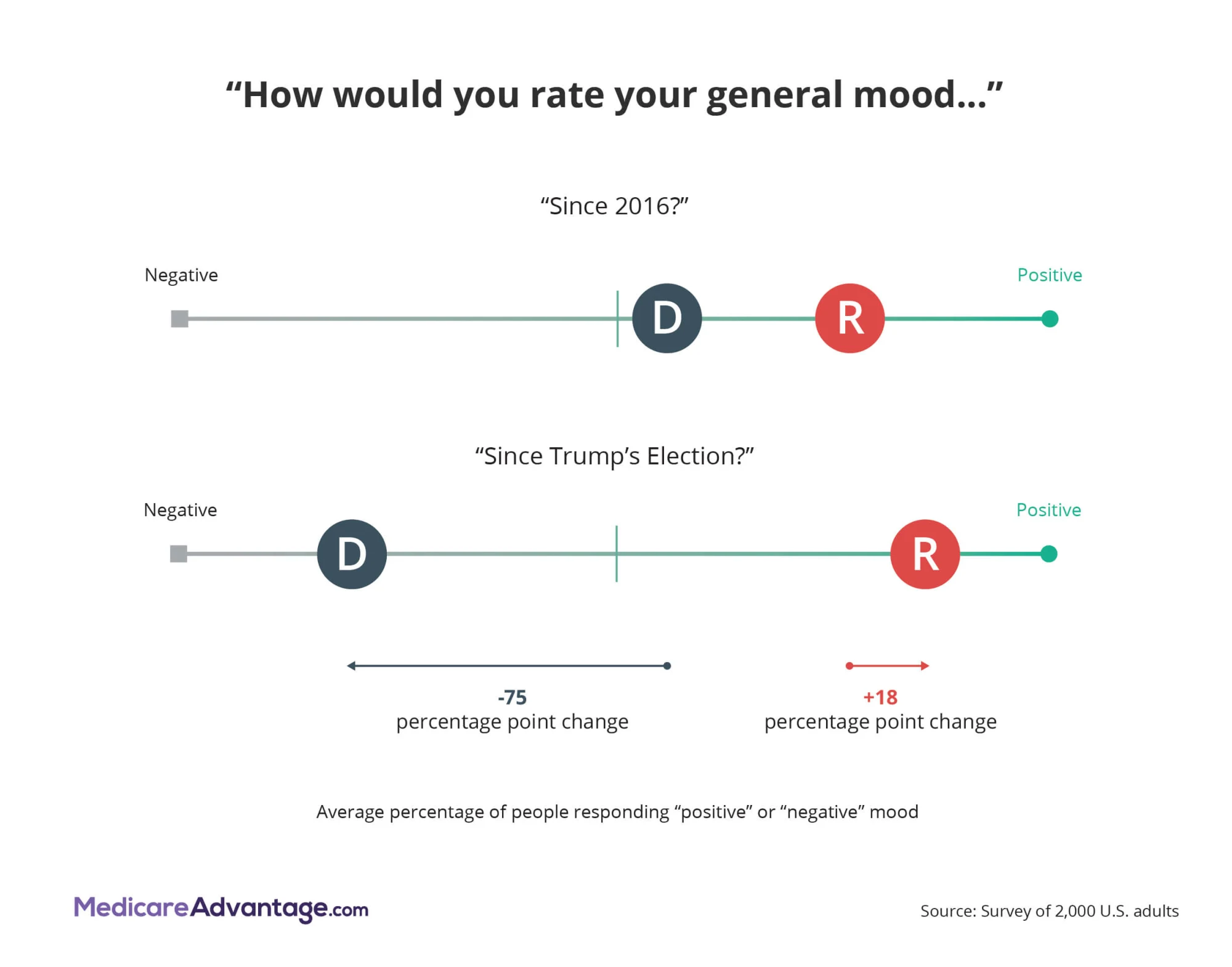
Americans’ perceptions of their overall mental health and mood are dramatically affected when asked explicitly political questions.
When asked about their general mood since 2016, 47% of Democrats and 40% of Independents reported it to be positive. But when asked about their overall mood since Trump’s election, only 7% of Democrats and 16% of Independents reported it as positive.
A negative mood was reported by 33% of Democrats when asked about their mood since 2016. That number more than doubled to 68% when asked about their mood since Trump was elected.
Meanwhile, 51% of Republicans reported an overall positive mood since 2016. That number increased to 57% when Trump’s name was mentioned.
Lynell Ross, a Certified Health and Wellness Coach, Behavior Change Specialist and the founder of the life-advice website Zivadream, says our own human DNA may partly be at play.
“Humans are hard-wired with a negativity bias, which means two out of every three thoughts are negative or fearful,” said Ross. “A lot of this kind of thinking runs in the background of our day, causing us to feel nervous or irritable without being fully conscious of why we feel that way.”
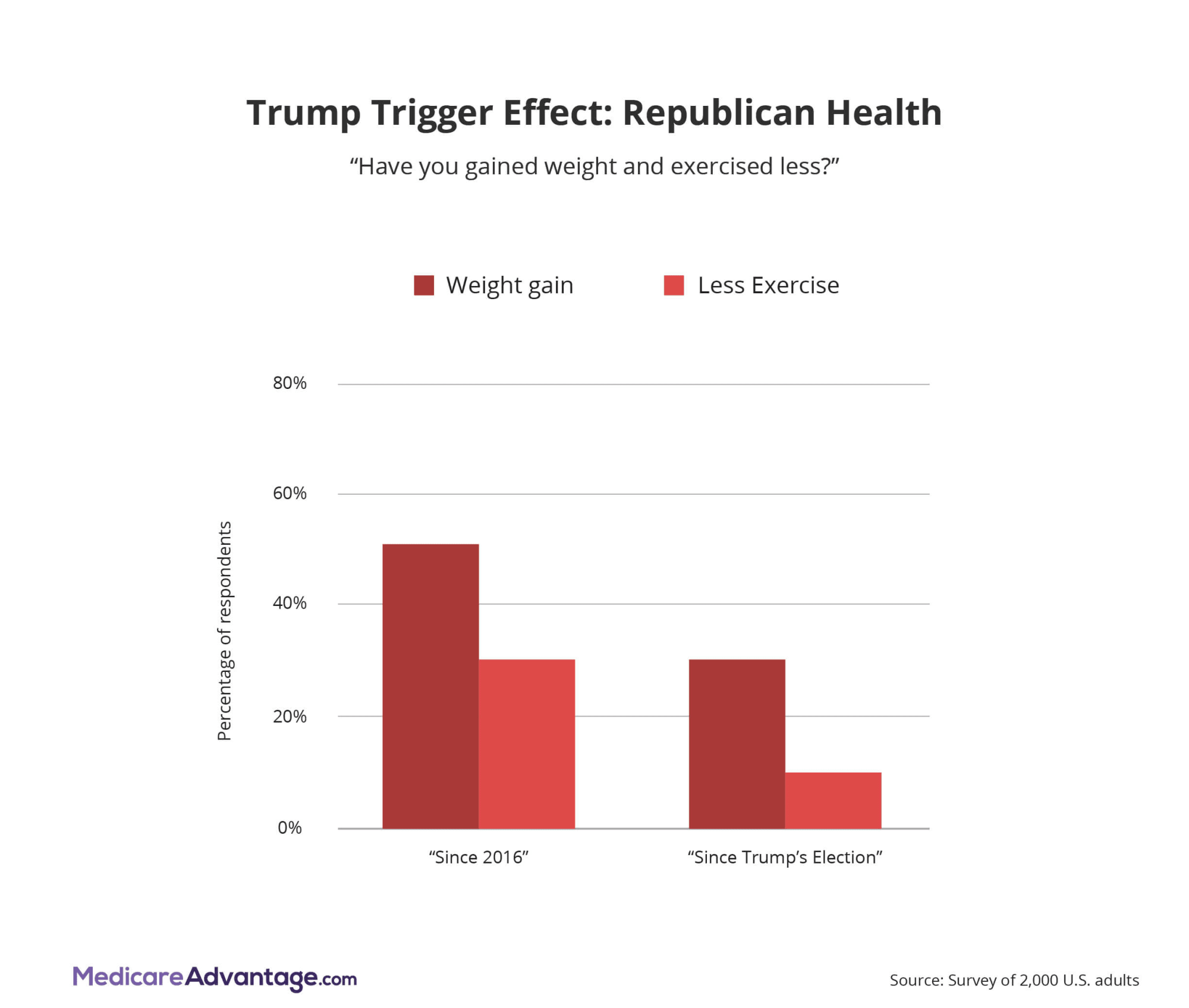
Republicans are more likely to report being in better physical shape when asked about their health since Trump’s election as opposed to since 2016.
Only 30% of Republicans admitted to gaining weight since Trump was elected, but 53% of Republicans said they’ve gained weight since 2016.
Worsened exercise habits were reported by 24% of Republicans since 2016, but only 10% of Republicans reported exercising less since Trump was elected.
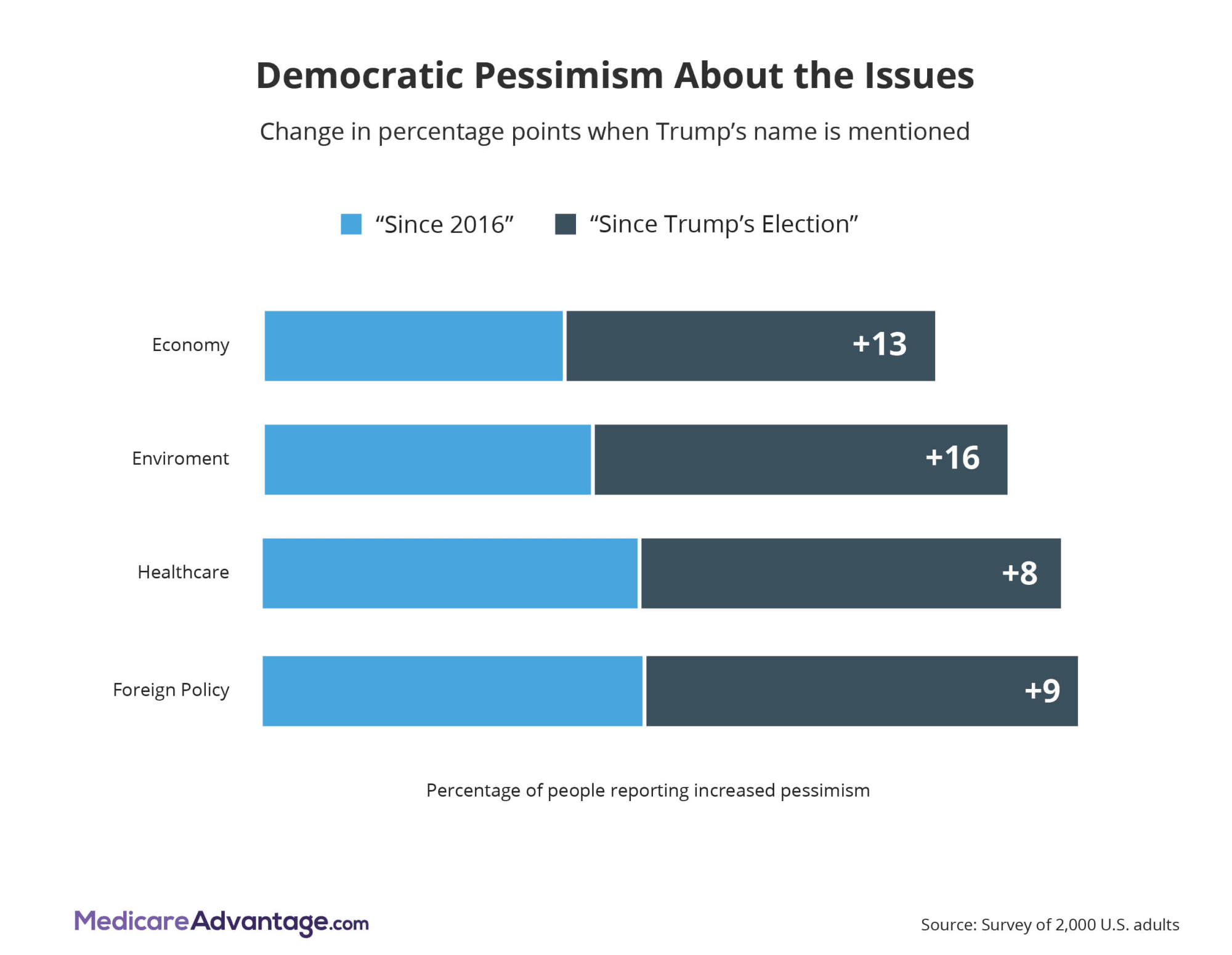
Democrats report higher anxiety about the economy, the environment, health care and foreign policy since Trump’s election as opposed to since 2016. Republicans conversely report a more optimistic outlook.
The word “Trump” proved to not only influence the way our survey respondents viewed their physical health, but also their mental health and their anxiety about the world around them.
Democrats reported higher anxiety and increased pessimism when asked about various issues since 2016 versus since Trump’s election.
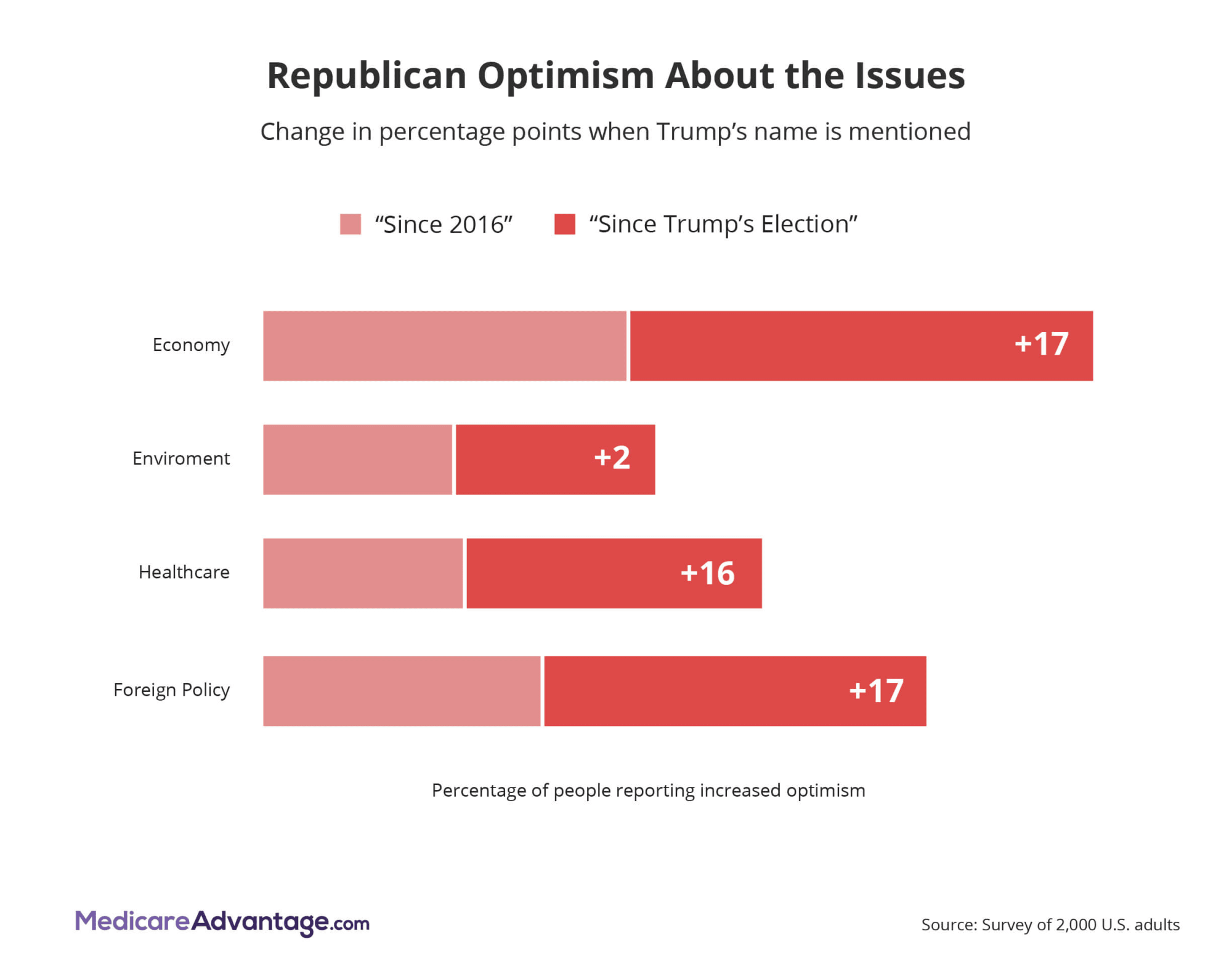
Meanwhile, Republicans displayed a nearly identical amount of change in their optimism and positive outlook related to the same issues when Trump’s name was included in the question.
“When we think we are going to be hurt in our wallets, our healthcare and our environment, we feel threatened, and our brains go into fight or flight mode.” - Lynell Ross, Certified Health and Wellness Coach and Behavior Change Specialist
Those who disapprove of Trump report a higher level of anxiety to talk politics when they know it’s likely to spark disagreement with friends or family. Those who approve of Trump report a lower level of anxiety to do so.
Talking politics with friends and family who reside on the other side of the aisle is never easy. But our data indicates that it’s even tougher for those who disapprove of Trump.
Nearly three-quarters of those who disapprove of Trump (72%) reported feeling some anxiety about talking politics with friends or family when they know it’s likely to spark a disagreement.
But for those who approve of Trump, only 53% reported feeling that same anxiety.
“The genetic programming of our species is designed to seek out pleasurable experiences and to avoid situations that would cause stress or pain.” - Jodi De Luca, PhD., Licensed Clinical Psychologist
The above notion was supported by additional data centered around 2020 election anxiety. 45% of Democrats reported feeling negative anxiety about the November 2020 presidential election, compared to only 16% of Republicans.
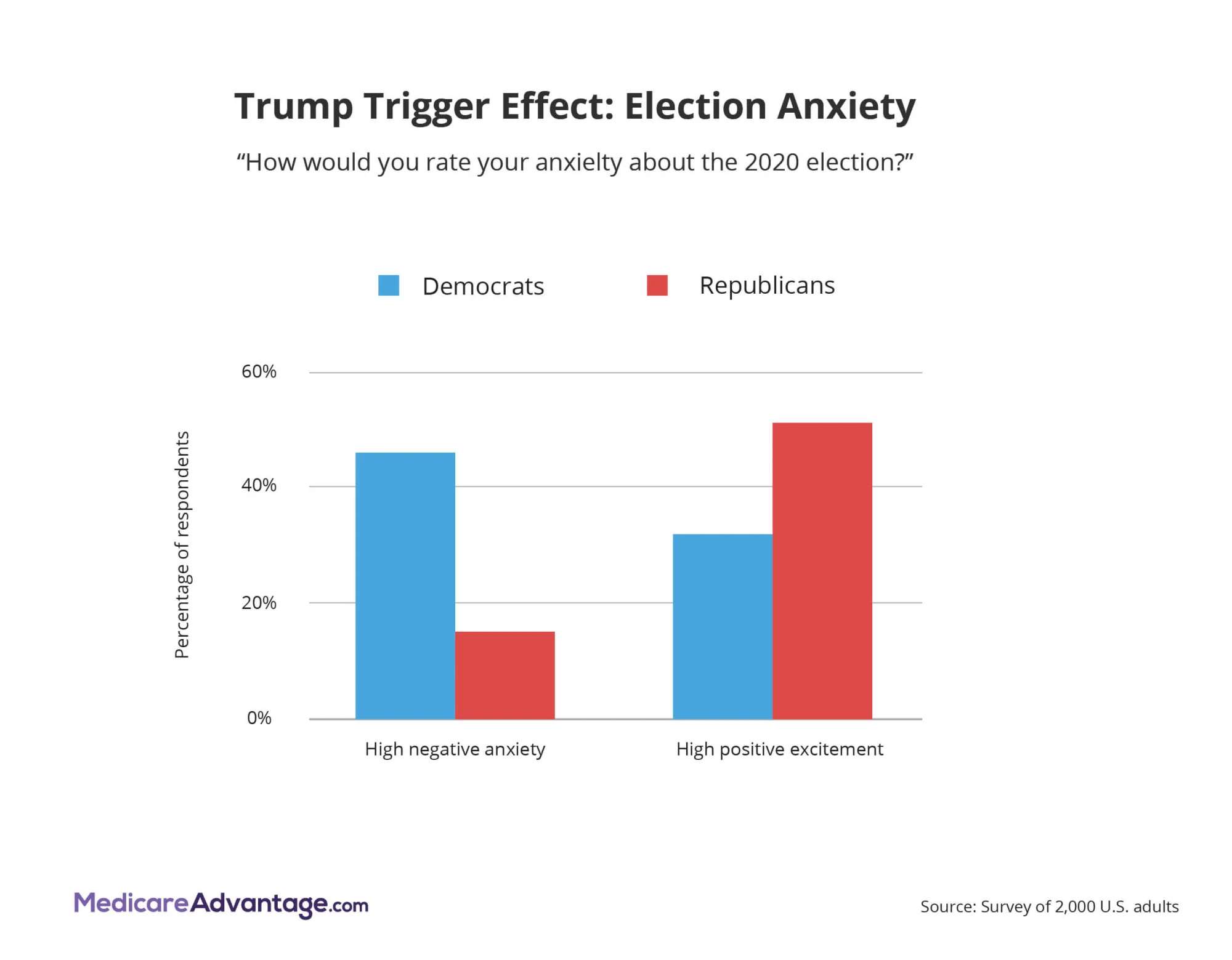
Meanwhile, 55% of Republicans said they were positively excited for the election, while only 34% of Democrats said the same.
“Election anxiety is very real,” said Dr. Steven Rosenberg, a Psychotherapist and Behavioral Specialist in Philadelphia. “Anxiety can cause a variety of extremes in behavior from overeating, excessive smoking or drinking, sleep disturbances and more.”
Self-reporting about lifestyle habits changed when Trump’s name was mentioned.
Self-reporting about health and lifestyle habits was also affected by whether or not the name “Trump” was used in the question.
Alcohol consumption
29% of Democrats reported to be drinking less alcohol since 2016, but only 14% said they were drinking less since Trump’s election.
20% of Republicans said they had been drinking more since 2016, but only 14% claimed to be drinking more since Trump’s election.
Smoking
Only 15% of Republicans said they have been smoking less since 2016, but that number more than doubled to 36% who reported smoking less since Trump was elected.
Sleep
31% of Republicans reported to be sleeping 1-3 fewer hours per night since 2016, but only 9% claimed the same amount of sleep loss since Trump’s election.
“Without proper sleep, the all-important immune system suffers and does not respond as effectively to infections. Diabetes has been linked to sleep quality, for the body’s response to insulin is affected by insufficient sleep. Sufficient sleep is necessary for proper brain function; deficient sleep contributes to poor decision-making, emotional dysregulation, inattentiveness, problem-solving difficulties, and lack of focus.” - Dr. Carla Marie Manly, Clinical Psychologist and author of Joy From Fear: Create the Life of Your Dreams by Making Fear Your Friend
Comfort eating
40% of Republicans reported eating comfort food to alleviate anxiety either daily or weekly since 2016, but just 25% admitted to the same since Trump was elected.
Democrats’ responses showed virtually no change.
Republicans and Democrats did have one thing in common, however, when it comes to comfort eating: the majority of respondents from both sides of the aisle answered that their preferred comfort food in times of high anxiety are chips and other salty snacks.
Therapy
Only 9% of Republicans reported that they started seeing a therapist since Trump was elected, but 17% claimed to have started therapy since 2016.
Anxiety
The Trump name seemed to have an effect on reported anxiety levels for both Republicans and Democrats alike.
- For Democrats, 59% reported increased anxiety since 2016, a number that jumped to 66% when phrased as “since Trump’s election.”
- The inverse was true for Republicans. 52% of Republicans reported increased anxiety since 2016, while only 21% reported increased anxiety since Trump’s election.
Similarly, 25% of Republicans reported starting the use of an antidepressant since 2016, but only 12% reported doing so since Trump was elected.
Jodi De Luca, a Licensed Clinical Psychologist in Colorado, spoke about the correlation between stress and the sense of control as it relates to politics.
“Knowing that we have some sense of control in life is critical in our overall well-being, and essential in the management of stress,” De Luca said. “Our control over the current political climate is seemingly limited, and in many ways this lack of control inhibits our ability to manage politically related stress.”
Relationships
17% of Democrats reported experiencing a worsened relationship with a friend or family member since 2016. But when asked if any such relationships had worsened since Trump’s election, 34% of Democrats replied that this was the case.
When asked if any of their close relationships had improved, a disparity remained: 14% of Democrats said their relationships had improved since 2016, compared to only 6% who reported similar improvements since Trump’s election.
Energy level
32% of Democrats reported having more energy since 2016, but only 13% reported a higher energy level since Trump’s election.
Among Republicans, 37% reported having less energy since 2016, but only 15% reported having less energy since Trump’s election.
“In today's political climate we spend all day on high alert, burning out our adrenal glands, and hurting our mental well-being. Our stress hormones take over, and we do things like overeat for comfort, drink alcohol to excess, numb out on social media, feel helpless, and drained of energy that often keeps us from exercising.” - Lynell Ross, Certified Health and Wellness Coach and Behavior Change Specialist
Conclusions
Our study doesn’t reach any conclusions about the direct cause of how and why people’s health habits, physical health and mental health have improved or declined since 2016.
We can, however, conclude that when our survey respondents assessed their personal health, the name “Trump” tended to cause a wider range of variance in their answers and an increased tendency toward the extremes, either positive or negative.
When viewed through this lens, it seems apparent that some of the perceived positive and negative effects of Trump’s 2016 election on American health may be just that: perceived. The results depend on who – and how – you ask.
Methodology
This study was conducted in February 2020 using Cloud Research via Amazon's Mechanical Turk. The total survey side included two separate surveys: over 1,009 respondents for the survey that doesn’t mention Trump by name, and 953 respondents for the survey that explicitly mentions Trump.
Participants were filtered to exclude heavy users of the Mechanical Turk platform, as well as based on completion time and failure to follow written instructions within the survey.
Age distribution:
18-24 238
25-34 698
35-44 455
45-54 276
55-64 191
65+ 104
Margin of error: +/- 5 %
This survey relies on self-reported data.
Notes
While we tried to remain as scientific as possible in our methodology, any study of health remains highly subjective. These results show an association but do not prove causality.
Fair Use Statement
Of course we would love for you to share our work with others. We just ask that if you do, please grant us the proper citation with a link to this study so that we may be given credit for our efforts.
Research and reports
Our research reports analyze a number of issues important to seniors, from health perceptions, medical communication, health habits, and more.
Contributors
- Lynell Ross, Certified Health and Wellness Coach and Behavior Change Specialist, Founder of Zivadream
- Jodi De Luca, Ph.D., Licensed clinical psychologist
- Steven Rosenberg, Ph.D., Psychotherapist and Behavioral Specialist
- Carla Marie Manly, Ph.D., Clinical Psychologist
